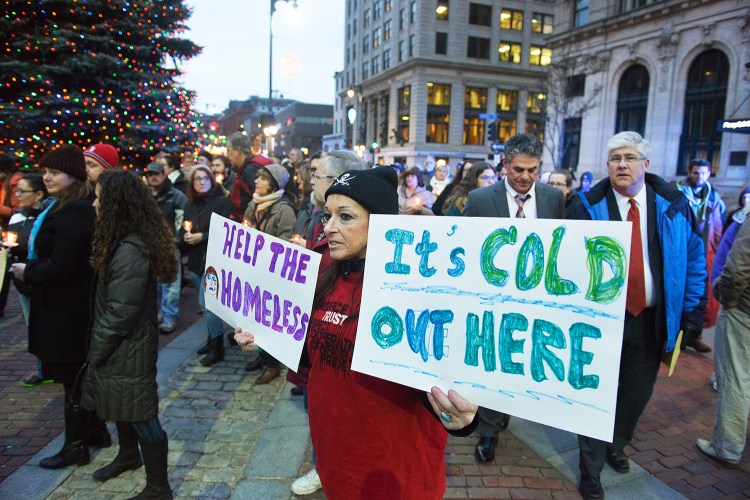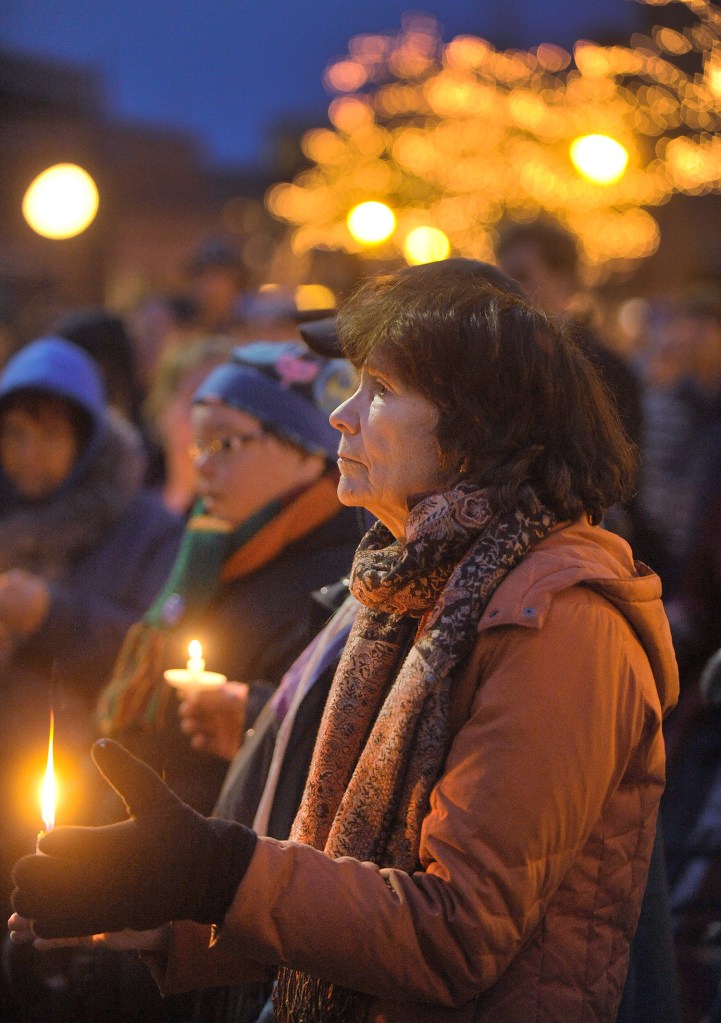Volunteers read each of the 43 names aloud in front of the Christmas tree in Monument Square on Monday to remember the record number of homeless people who died in Portland this year. A candle was lit as each name was read.
Officials said more homeless people died in the city in 2015 than in any other year during the 21 years that the Homeless Persons’ Annual Memorial Vigil has been held, always on Dec. 21, the longest night of the year. Thirty-five died in 2014. In the 1990s and 2000s, about 20-25 homeless people died every year in Portland, officials said.
Three people died in the past week, those advocating for the homeless said.
“It’s been awful,” said Mark Swann, executive director of Preble Street Resource Center, an agency in Portland that works to help the homeless. “It seems like every other week we’re having memorial services in the soup kitchen. It’s unprecedented.”
Swann attributes the increase in deaths to multiple factors, including the heroin crisis and more people sleeping at campsites and on the streets.
He said he’s never seen as many people sleeping in doorways, although it’s difficult to quantify because unlike people who stay at the shelter, they are not regularly counted. About 400 people sleep in Portland’s homeless shelters each night.
Last week, Preble Street officials speculated that stricter rules for staying at the shelter, such as going through a metal detector and having their bags searched, may be contributing to the problem, along with the heroin crisis.
“They’re not getting away with something or abusing our system. What are they doing? They’re dying,” Swann said.
Sally Hutchinson of Portland said she was homeless for a couple years recently before being accepted into a recovery home to treat her alcoholism. Hutchinson said her addiction caused her to lose her jobs operating a cleaning business and waitressing, and she also had spent time in jail for driving under the influence and other alcohol-related offenses. She was afraid to stay at the shelters and used to couch-surf by staying with friends on some nights, walking the streets of Portland on others and sleeping in doorways.
She said she’ll never forget her time on the streets, and she was in Monument Square on Monday to support efforts to reduce homelessness.
“When you’re homeless, you feel helpless and lost,” said Hutchinson, holding up signs saying, “It’s Cold Out Here” and “We Are People Too.”
Denny Parham, who spoke at the event, knew several of the homeless people who died this year, and she’s heartbroken every time she hears of another death.
Parham, 57, said she’s homeless and stays at the city’s Oxford Street shelter, but she’s piecing her life together and expects to have housing within a few months. Parham said she was formerly addicted to heroin.
“We’re homeless, we’re sick, but we’re part of this community. Does anybody care?” Parham said to the crowd. Several people shouted, “Yes!”
Swann believes the heroin epidemic and the lack of treatment options for those without health insurance is one reason deaths among the homeless have surged, although he didn’t know how many of the homeless had died of drug overdoses. He said he’s heard anecdotally that there were heroin overdoses among the homeless, or that chronic substance abuse was a contributing factor in their deaths.
“It’s all interrelated,” Swann said. “We can’t get people into treatment programs that don’t exist.”
Statewide, heroin overdoses climbed from seven in 2009 to 57 in 2014, with Maine on track this year to surpass last year’s numbers. Through the first six months of 2015, there were 37 heroin deaths, according to the Maine Attorney General’s Office.
Swann said he hopes the state expands access to substance-abuse treatment programs.
“This didn’t have to happen. Things could be different, and they should be different,” Swann said.
Send questions/comments to the editors.





Comments are no longer available on this story